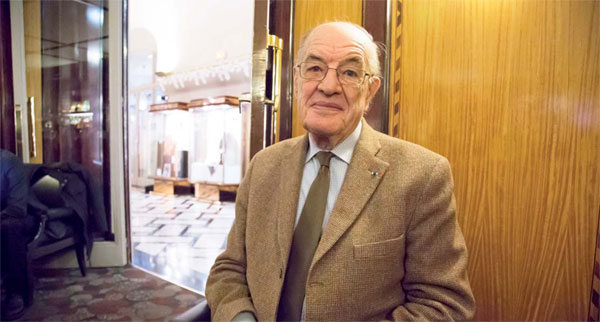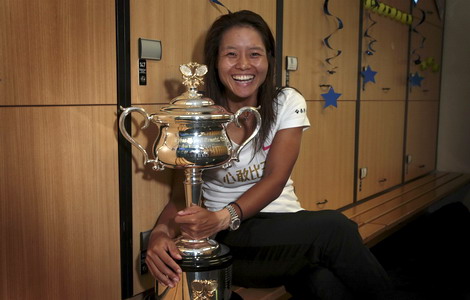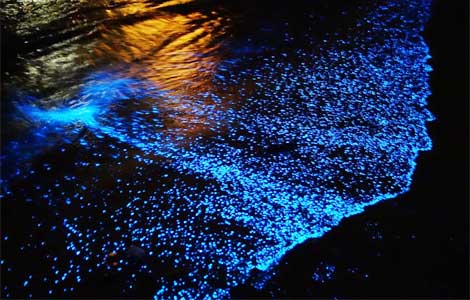Golden memories of a great man
Updated: 2014-01-24 08:52
By Li Xiang in Paris (China Daily Europe)
|
|||||||||||
|
Bernard de Gaulle believes France and China will have more successful relations in the future. Li Xiang / China Daily |
Momentous diplomatic breakthrough and what came next
With a long and narrow face, a high nose and imposing stature, Bernard de Gaulle is as easily recognizable as his last name.
At the age of 91 he bears a strong resemblance to his uncle Charles de Gaulle, the late French president, whose decision to recognize Beijing's new government 50 years ago turned a new page in China-France relations and made De Gaulle a household name in China.
Another similarity Bernard shares with his uncle is the connection with China. But unlike his uncle, Bernard did not pursue a political career. He became a businessman and described himself "a man of industry", with nearly 50 years' experience in the electronics industry.
One of the most memorable events of his career was his trip to Beijing in 1964 making him a pioneer of Sino-French commercial relations.
The momentous decision of his uncle to normalize relations with China, described by Western media at that time as a "diplomatic nuclear explosion", was hardly a surprise to Bernard because the desire between Beijing and Paris to break the Cold War mindset in the business field was already simmering beneath the surface of the political confrontation between the two blocs.
'It was all in the atmosphere," says Bernard, who was then the general manager of an electronics company. After the announcement, he was sent to Beijing to organize an electronics exhibition.
"I never follow ideological confrontation," he says softly but firmly. "And I've always felt that China is important."
In fact, the idea for the exhibition was first raised in 1953 when Bernard met Chinese officials of the China Council for the Promotion of International Trade in East Berlin. The decision was finalized in 1963, one year before the official normalization of diplomatic relations between Beijing and Paris, he says.
Because of the exhibition, he managed to visit China in the 1960s and made the trip that his uncle had always wished to make but that never materialized.
Bernard clearly recalls the difficulties of putting on the exhibition in China, a country that was completely unknown to him, although he had some experience in Hong Kong as a representative of a French company in the 1950s.
"The transport was difficult because there was no direct airline. And we had to bring literally everything from France, even including the nails for setting up the exhibition."
But the exhibition was a success, and he was later invited to a lunch banquet and says he had a three-hour conversation with Chairman Mao Zedong in Hangzhou, Zhejiang province.
Bernard is still unwilling to reveal what they talked about, but says he was impressed by Mao's judgment on the world situation and China's own state of affairs in the 1960s when Beijing was not only in conflict with the US-led Western bloc but also its neighbor, the Soviet Union.
From the words of Mao, he says, he could sense that the tension between Beijing and Moscow was at its apogee. His business instinct told him that the Soviet model would not work for China and that something big was about to happen.
In the following two years he helped organize another two electronic exhibitions in Beijing and Shanghai, but they were not as successful as the first as the "cultural revolution" (1966-76) loomed. Later direct trade and business exchanges between China and the rest of the world halted.
Contact was resumed in the 1970s and Bernard was able to revisit China in 1976 and met the Chinese leader Deng Xiaoping, the mastermind of China's adoption of the market economy.
"It was a critical moment. Deng was not yet the big boss but I could sense he would be in power soon," Bernard says. In their two-hour conversation, Bernard says that the most memorable line from Deng was that "you must be very Chinese-minded in order to understand China".
"A lot of French people do not understand what China really is," he says. "It is the same for the Chinese as many heads of business corporations don't have much idea about France."
Bernard's advice to current political leaders of China and France, in addition to improving mutual understanding, is patience.
"Do not hurry. Let time allow people to meet and to understand each other."
In the late 1960s, Bernard began to work for the French telecommunications company Alcatel and retired in the early 1990s as the company's senior executive. He last traveled to China last year, and he says he was surprised by the country's transformation over the decades.
"The urbanization was massive and there are so many towers and high buildings. I used to love Suzhou, the town of silk, very much. But I don't recognize it now and it has become a very industrialized city."
Bernard was born in Montceau-les-Mines, Burgundy, in 1923. His father Jacques de Gaulle, a mining engineer, was the French president's younger brother and the one in the family who had the closest relationship with the president.
When his father suffered a stroke when he was in his 30s that left him paralyzed, Uncle Charles decided to take care of his brother's sons.
"He almost adopted his nephews," Bernard says.
At the age of 10, Bernard was asked by his paralyzed father to read him newspapers and Uncle Charles' books every day. "This was how I developed knowledge about his ideas and international affairs."
But asked about the biggest influence of his uncle on him, Bernard mentions neither his uncle's military experience nor his political ideas. His answer is simple: "He loved my father."
Perhaps another thing Uncle Charles left him is the relationship with China as the former president used to offer private support to his nephew's early career in China.
More than half a century later, Bernard still recalls the words his uncle wrote to him in a letter in 1954. "He wrote: 'Bernard, I follow your career in industry. You are in China. Despite the war, please continue and do not compromise yourself.'"
Today one of Bernard's sons works in Shanghai as a lawyer and one of his great grandchildren is half Chinese.
Looking at the occasion of the 50th anniversary of Sino-French diplomatic relations, Bernard expresses optimism. "I am confident that our two countries will arrive at more successful relations in the coming years."
lixiang@chinadaily.com.cn
(China Daily European Weekly 01/24/2014 page7)
Today's Top News
More than 300 fall ill on Royal Caribbean ship
8.8% salary hikes expected for 2014
China turns the tables on gamblers
China takes measures against H7N9
Terrorists behind twin explosions in Xinjiang
2014 diplomatic strategy outlined at Davos
China reports another H10N8 case
Big events in the Sino-French relations
Hot Topics
Lunar probe , China growth forecasts, Emission rules get tougher, China seen through 'colored lens', International board,
Editor's Picks

|

|

|

|

|

|






